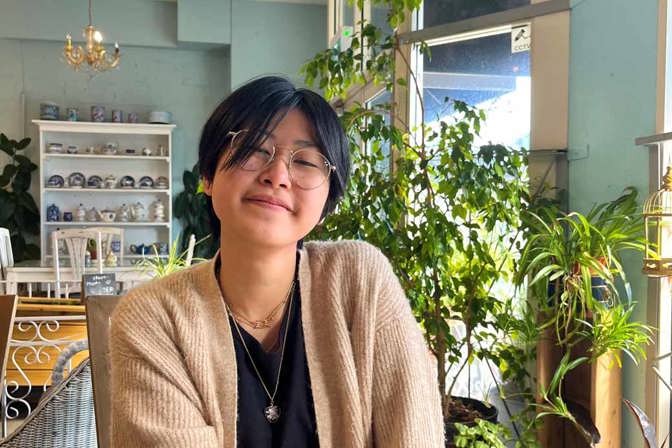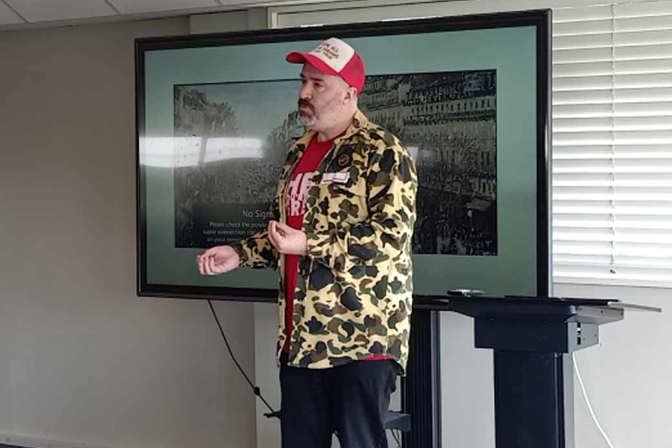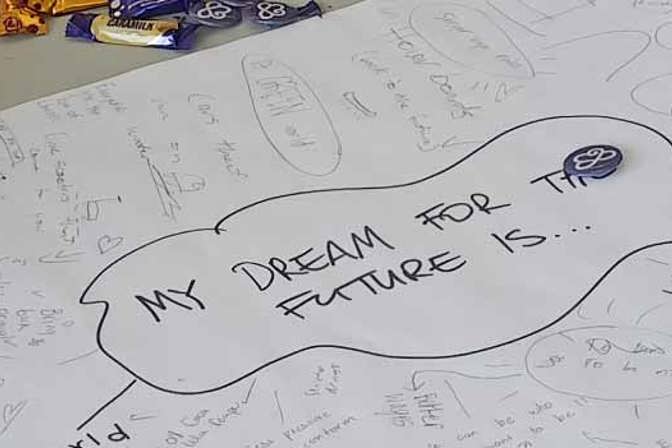Our Ōtautahi – Stronger Together : Inspiring youth to lead the change
Ngan Dang, youth leader and year 13 student at Te Kura Tuarua o Horomaka Hillmorton High School in 2023, is our guest writer. In this story, Ngan reports on the second rangatahi-led and co-designed hui. Read Ngan’s story to inspire you to amplify youth leadership in your kura or use the additional resources to explore more.
Inspiration to create an inter-school project
From social injustice to climate change, rangatahi of Waitaha are facing pressing challenges shaping our futures. In tough times, we need the next generation to develop a strong sense of belonging. We have been inspired to create an inter-school project in Waitaha, aiming to bridge the social gaps between rangatahi from diverse backgrounds and beliefs.
After the first rangatahi-led hui in 2022, many of us wished to continue our conversations about tūrangawaewae/belonging in Waitaha. Rangatahi want a rangatahi-led space to connect and collaborate on positive action. Motivated by this, student leaders from three different schools, alongside Mahia te Aroha, co-designed the second student hui in 2023. Our group consisted of St Andrew’s College students Radha Vallabh, Jack Satterthwaite, and Elliot Graves; Ngan Dang from Te Kura Tuarua o Horomaka Hillmorton High School; and Mya Wolfenden from Rangi Ruru Girls' School.
Our 2023 hui sought to inspire rangatahi to step into leadership roles and lead positive changes for the future. The hui explored tūrangawaewae/belonging in three aspects:
- I
- We
- and Community.
Students participated in interactive activities and gritty discussions to connect and reflect on their daily experiences.
Breaking the “school boundaries”
In Waitaha, the schools we go to often define our social groups. Students tend to judge each other based on deep-rooted stereotypes associated with one’s school. This creates division, preventing rangatahi from branching out beyond their familiar community.
Breaking down these preconceptions was a key aim of our hui. The hui was a non-uniform event and rangatahi were separated into random groups to collaborate. This encouraged participants to look beyond the label and connect on a deeper level. By removing the emotional barriers between rangatahi from different schools, we set a welcoming environment for young people to express their thoughts and experiences.
Who am I?
Young people are feeling more emotionally isolated than ever with the challenges and responsibilities on their shoulders. The pressure to fit into the norm leaves young people feeling alone, unable to open up to others. This shared sentiment emphasises how judgment, significant or not, affects our sense of tūrangawaewae/belonging.
The first session of the student hui tackled this by focusing on the I: understanding belonging within oneself. We listened to Riccarton Ward councillor Tyla Harrison-Hunt sharing the life stories that defined him, and how we should embrace our unique differences.
An icebreaker followed in small groups where we developed genuine connections. The activity encouraged us to introduce ourselves and get to know others, beyond typical small talk. Students discussed their interests, plans, hopes, and fears with enthusiasm. Many did not expect the similarities they shared with others, which they would not have discovered in their school bubbles.
The icebreaker served as a reminder that relationships and our sense of tūrangawaewae/belonging lie beyond the visible labels put upon us.
Embracing vulnerability to enhance belonging
Rangatahi express a strong desire to meet up with fellow students outside their own school gates. The hui provided a welcoming space to meet fellow students from different schools and learn from their experiences.
The second section of the hui focused on the “We” of tūrangawaewae/belonging. We brought forward questions about how our community can come together to enhance our sense of tūrangawaewae/belonging.
In the interactive activity Cross the Line, students “cross the line” if they resonate with a certain statement. The prompts ranged from simple questions such as “Cross the line if you have lots of chores to do at home”, to more personal statements like “Cross the line if you’ve been told you can’t do something because of your gender.” Students gained a sense of belonging in this space, learning that many others experience the same challenges they encounter daily. The welcoming environment encouraged us to embrace vulnerability and share heartfelt discussions on tūrangawaewae/belonging.
“[I’ve learnt that] you’re not alone. There are definitely going to be other people who have experienced the same things that you have, or are going through the same things that you are. So you don’t have to feel alone, and it’s okay to be vulnerable and talk to people.”
Talyana, ākonga from Te Kura Tuarua o Horomaka Hillmorton High School
“Showing that vulnerability with strangers was empowering…the fact that it was with strangers was awesome, that they could claim parts of identity that maybe [they] haven’t expressed before.”
Kaiako participating in the student hui.
“It is something you can bring [back] to the school because you can have that kind of community”.
Finn, ākonga participating in the student hui.
Through robust student-led discussions, we formed new relationships and a newfound empathy for each other, beyond stereotypes. It is a crucial first step for rangatahi to understand tūrangawaewae/belonging; and why it is important to continue the fight for an inclusive future.
Encouraging positive action
Young people see the need for important changes in their communities. However, various barriers prevent us from making a significant impact.
There is a feeling that older generations often brush off constructive inputs from rangatahi. Sometimes, people in power can get caught up “in their own agenda,” assuming that rangatahi do not have the experience to understand complex social problems. This limits the support and opportunities for us to make a difference through leadership roles in our communities.
Some young people also believe rangatahi lack awareness and are reluctant to be the change. Resisting the norm might not be the “cool” thing to do. The fear of judgement from peers discourages many passionate rangatahi from speaking up for the causes they believe in.
“It can feel that way sometimes, just that [making change] it’s not a cool thing to do.”
Murphy, ākonga participating in the well-being student hui.
“You want to be accepted amongst your peers, it’s not really something you want to do – it can be a bit difficult.”
Finn, ākonga participating in the well-being student hui.
Our hui emphasised the importance of rangatahi collaborating and leading change in Waitaha. Guest speaker Abraham Larsen, the inclusivity advisor for Christchurch City Council, highlighted the many ways that rangatahi can demand change to contribute to a more welcoming society. He reminded us about the power that rangatahi hold, as current and future leaders, to enhance tūrangawaewae/belonging in our communities.
Continuing the conversation
Waitaha is a growing and diverse community. However, prejudice is still visible in aspects of our lives. It is easy for rangatahi to focus on the negatives, the growing division in our society. Our hui aimed to challenge complacency through hope, inspiring rangatahi to lead the change towards a more welcoming Waitaha.
At the end of the hui we, worked in groups for a brainstorming session, led by Mahia te Aroha’s peace educator Alice Andersen. The activity focused on four questions:
- What are some problems we are facing?
- What do you want the world to be in the future?
- What gives you hope for the future?
- What action can you take every day to make positive changes?
Using this framework, we created a personal pledge to contribute to the sense of tūrangawaewae/belonging and inclusivity in our local communities.
Coming out of the student hui, rangatahi made meaningful connections with peers across the region. Rangatahi also gained insights into the sense of tūrangawaewae/belonging and leadership from fellow students, guest speakers, and engaging activities. With an action plan, many rangatahi are motivated to spark positive change to grow the sense of tūrangawaewae/belonging in Waitaha, especially for youth.
More than ever, the world needs empathy, unity, and youth leadership, to progress society. Many students attending the hui emphasised the importance of student-led initiatives on youth wellbeing, encouraging leadership, and enhancing inclusivity in our communities. Rangatahi expressed that the student hui helped them build a welcoming space for rangatahi to open up and express their opinions. With this, rangatahi gained the confidence to be the change, knowing that they could have their voices heard.
Encouraging rangatahi to continue the conversation on inclusivity and follow it with genuine action is vital. We need to support rangatahi-led initiatives, as well as maintain safe spaces for Waitaha rangatahi to make connections, learn, reflect, and take action. Let’s continue to inspire rangatahi to lead our growing community into a welcoming and inclusive world.
Top tips for rangatahi leaders
- Be confident with your voice and opinions. They are valuable.
- Have a significant impact on others through small acts of compassion and inclusion.
- You’re not alone – many people around you share the same experiences, even when it doesn’t seem like it!
- You can make a difference in your community.
- Take the initiative to lead an important conversation in your circle.
- Look beyond the visible differences to connect to others.
- Be open-minded to different opinions, we learn and understand more when we try to listen.
- Build a support network around you before you try to introduce change to people. There is power in many voices.






